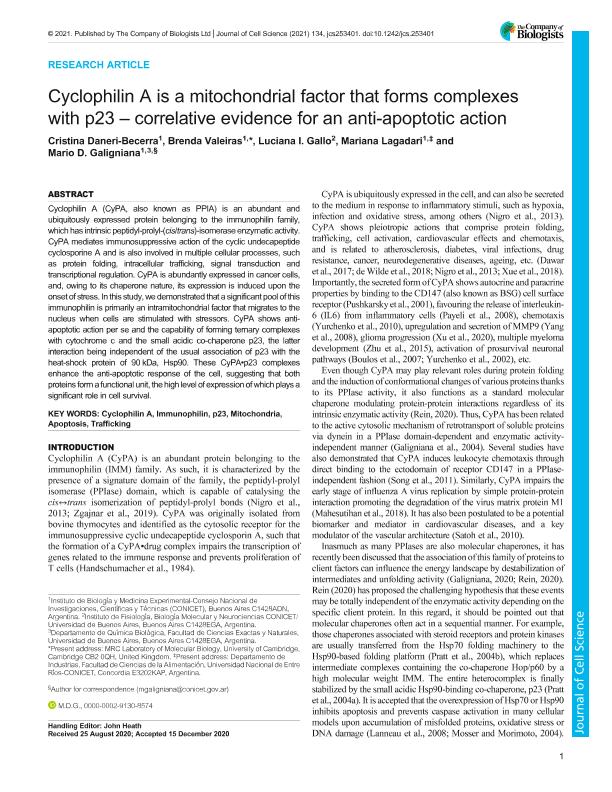Artículo
Cyclophilin A is a mitochondrial factor that forms complexes with p23 - correlative evidence for an anti-apoptotic action
Daneri Becerra, Cristina del Rosario ; Valeiras, Brenda
; Valeiras, Brenda ; Gallo, Luciana Ines
; Gallo, Luciana Ines ; Lagadari, Mariana
; Lagadari, Mariana ; Galigniana, Mario Daniel
; Galigniana, Mario Daniel
 ; Valeiras, Brenda
; Valeiras, Brenda ; Gallo, Luciana Ines
; Gallo, Luciana Ines ; Lagadari, Mariana
; Lagadari, Mariana ; Galigniana, Mario Daniel
; Galigniana, Mario Daniel
Fecha de publicación:
02/2021
Editorial:
Company of Biologists
Revista:
Journal of Cell Science
ISSN:
0021-9533
Idioma:
Inglés
Tipo de recurso:
Artículo publicado
Clasificación temática:
Resumen
Cyclophilin A (CyPA, also known as PPIA) is an abundant and ubiquitously expressed protein belonging to the immunophilin family, which has intrinsic peptidyl-prolyl-(cis/trans)-isomerase enzymatic activity. CyPA mediates immunosuppressive action of the cyclic undecapeptide cyclosporine A and is also involved in multiple cellular processes, such as protein folding, intracellular trafficking, signal transduction and transcriptional regulation. CyPA is abundantly expressed in cancer cells, and, owing to its chaperone nature, its expression is induced upon the onset of stress. In this study, we demonstrated that a significant pool of this immunophilin is primarily an intramitochondrial factor that migrates to the nucleus when cells are stimulated with stressors. CyPA shows anti-apoptotic action per se and the capability of forming ternary complexes with cytochrome c and the small acidic co-chaperone p23, the latter interaction being independent of the usual association of p23 with the heat-shock protein of 90 kDa, Hsp90. These CyPA•p23 complexes enhance the anti-apoptotic response of the cell, suggesting that both proteins form a functional unit, the high level of expression of which plays a significant role in cell survival.
Palabras clave:
APOPTOSIS
,
CYCLOPHILIN A
,
IMMUNOPHILIN
,
MITOCHONDRIA
,
P23
,
TRAFFICKING
Archivos asociados
Licencia
Identificadores
Colecciones
Articulos(IBYME)
Articulos de INST.DE BIOLOGIA Y MEDICINA EXPERIMENTAL (I)
Articulos de INST.DE BIOLOGIA Y MEDICINA EXPERIMENTAL (I)
Articulos(IFIBYNE)
Articulos de INST.DE FISIOL., BIOL.MOLECULAR Y NEUROCIENCIAS
Articulos de INST.DE FISIOL., BIOL.MOLECULAR Y NEUROCIENCIAS
Citación
Daneri Becerra, Cristina del Rosario; Valeiras, Brenda; Gallo, Luciana Ines; Lagadari, Mariana; Galigniana, Mario Daniel; Cyclophilin A is a mitochondrial factor that forms complexes with p23 - correlative evidence for an anti-apoptotic action; Company of Biologists; Journal of Cell Science; 134; 3; 2-2021; 1-11
Compartir
Altmétricas



